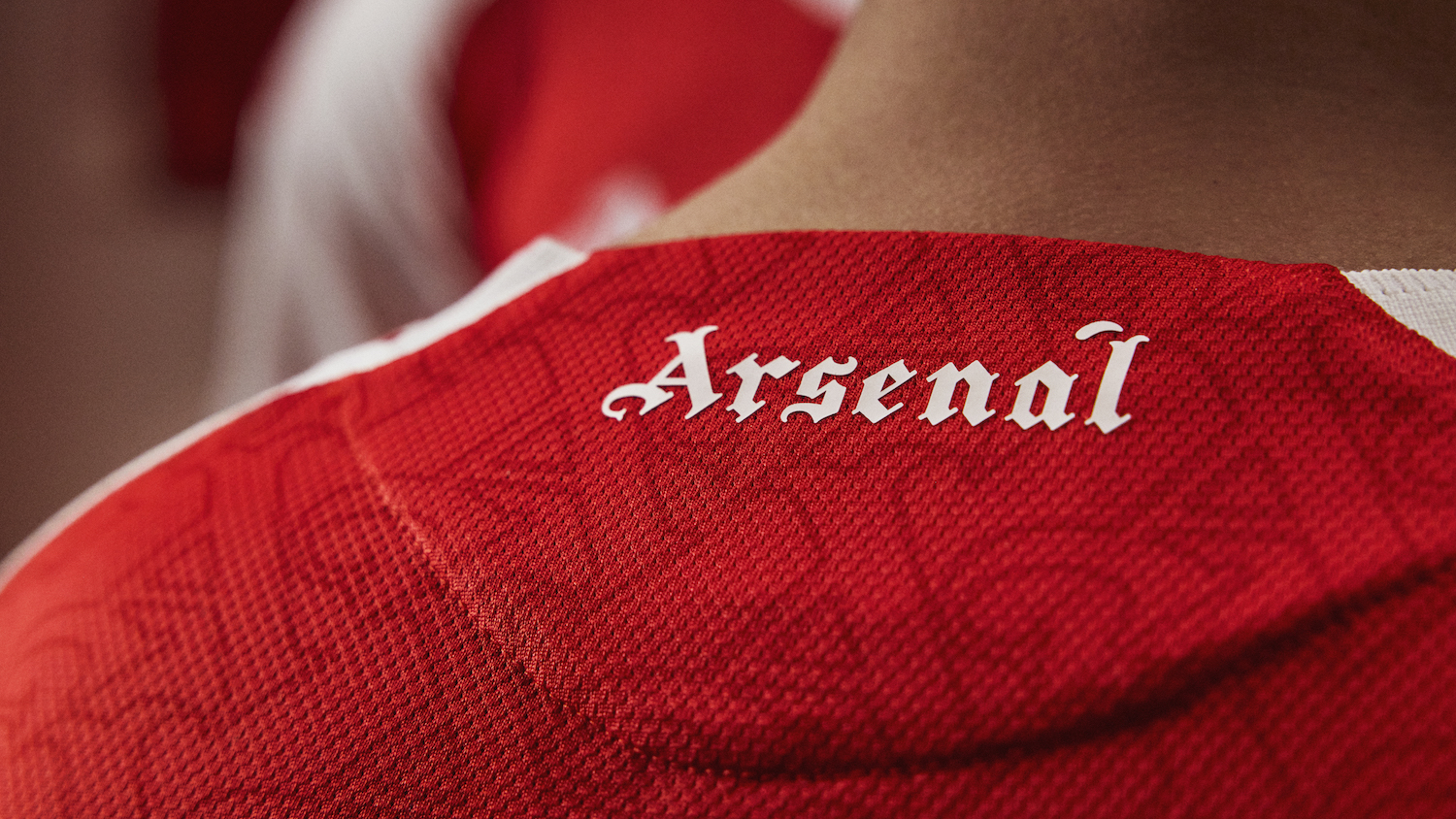Welcome to Iceland: when FFT went to a 10pm top-flight tussle... in broad daylight
They've become the smallest nation ever to qualify for the finals of a European Championship, with a population smaller than Leicester's. Andy Mitten finds out how...
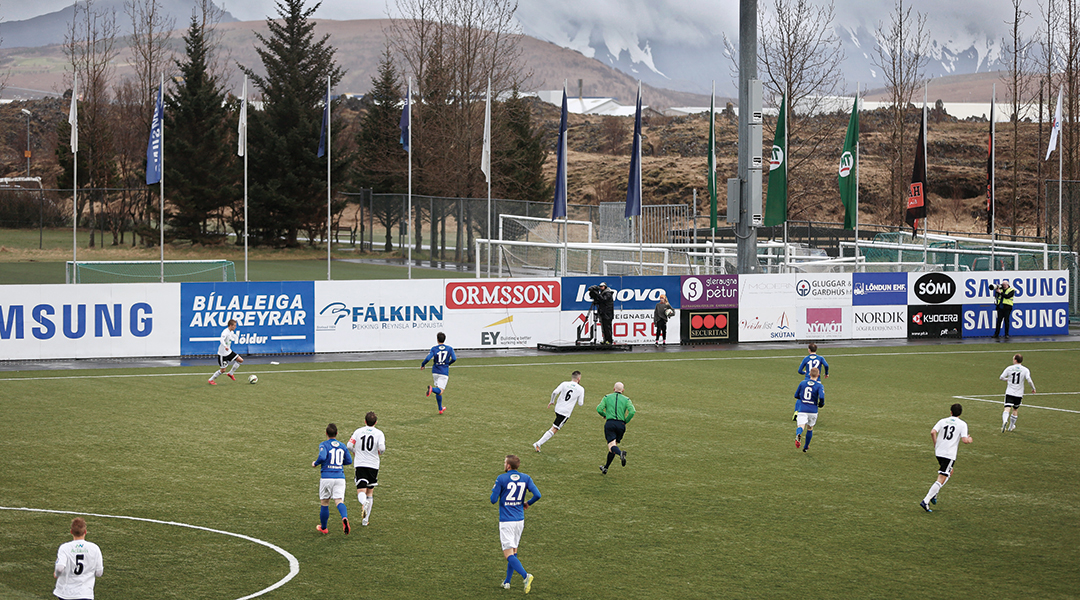
“The first thing I did was go to Millets for thermal socks,” explains a player who turned out alongside Wayne Rooney for England’s youth sides and spent 10 years of his life on the books of Chelsea.
When a British professional footballer signs a new contract, their next purchase tends to be a little more extravagant than hosiery, however warm.
Football is one of Britain’s greatest exports; British footballers are not. They tend to stay close to home. Yet in Iceland, with its volcanoes and earthquakes, more than a dozen Brits are playing in the top league.
“I knew little about Iceland,” recalls Sam Tillen, who was at Stamford Bridge until he was 20, when he moved to establish himself in Brentford’s first team. Injury and bad luck eventually left him out of contract and short on confidence. “My options were to either make a complete change, or give up on football altogether,” explains Tillen. “When you leave Brentford, you know you’re not going to La Liga or Serie A.
"An Icelandic mate asked if I was interested, and here I am.” The intelligent Tillen, now 30, is in his ninth season on the windswept, volcanic, frozen island and speaks fluent Icelandic, said to be one of the hardest languages to master. Brother Joe also spent seven years in the country.
Despite strong family links to Iceland, Harvey Moyes was equally naive about the nuances of Icelandic football. Nephew of David and grandson of David Sr, who was honoured by Iceland’s government for his services to sport, the midfielder joined KR Reykjavik in May 2015 (before moving on to IF Grotta in July).
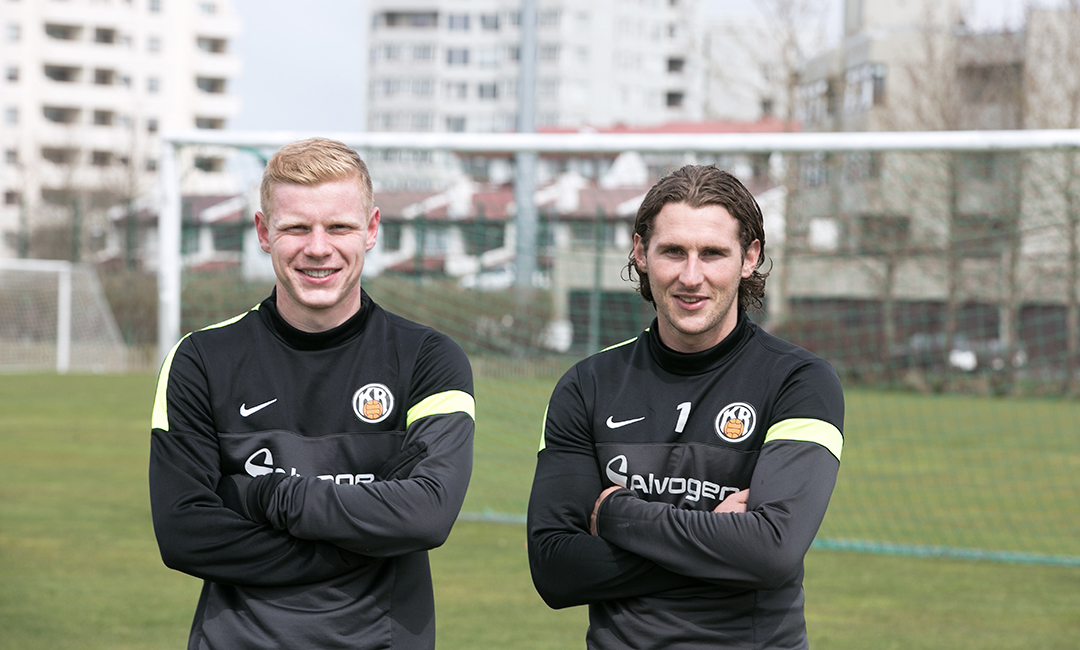
I pointed out to the groundsman that the pitch was dry and suggested he watered it. He laughed and said you can’t put water on pitches until June because they’ll freeze
“I pointed out to the groundsman that the pitch was dry and suggested he watered it,” says the former Partick Thistle and Carlisle United youth player. “He laughed and said you can’t put water on pitches until June because they’ll freeze.”
The best features, fun and footballing quizzes, straight to your inbox every week.
The elements are omnipotent in Iceland, which touches the Arctic Circle. Glacial winds can play havoc with football matches.
“They say if you don’t like the weather then you wait five minutes for it to change,” says another Brit, former Manchester United reserve captain Sam Hewson, who buys PG Tips from Iceland’s only Iceland frozen food store.
The Boltonian, who scored a penalty in front of Liverpool’s Kop in the 2007 FA Youth Cup Final and was on United’s bench for a Champions League game at Roma, is in his fourth season in Iceland. “I like it a lot,” he says. “It’s clean, the people are friendly and it’s so safe that people let their babies sleep outside their unlocked houses. I lost my mobile phone and someone handed it in to the police. But you have to get used to the darkness in winter, the constant light in summer, the snow and those winds. I’ve seen goalkeepers kick the ball to the other end of the pitch, but at the opposite end not be able to get it out of their own half.”
The Brits are among the best players in the Urvalsdeild, Iceland’s Premier League, whose top scorer last season was former Middlesbrough reserve Gary Martin. Ex-Rangers players Steven Lennon and Alan Lowing are both seasoned professionals there, while fellow Scot Iain Williamson is at Valur, one of a dozen clubs based in the capital, Reykjavik. Darren Lough, once of Newcastle’s reserves, is another longstanding recruit, while Matt Garner and Ian Jeffs, formerly of Crewe, have been at island club IBV Vestmannaeyjar for more than a decade and are now settled with young families.
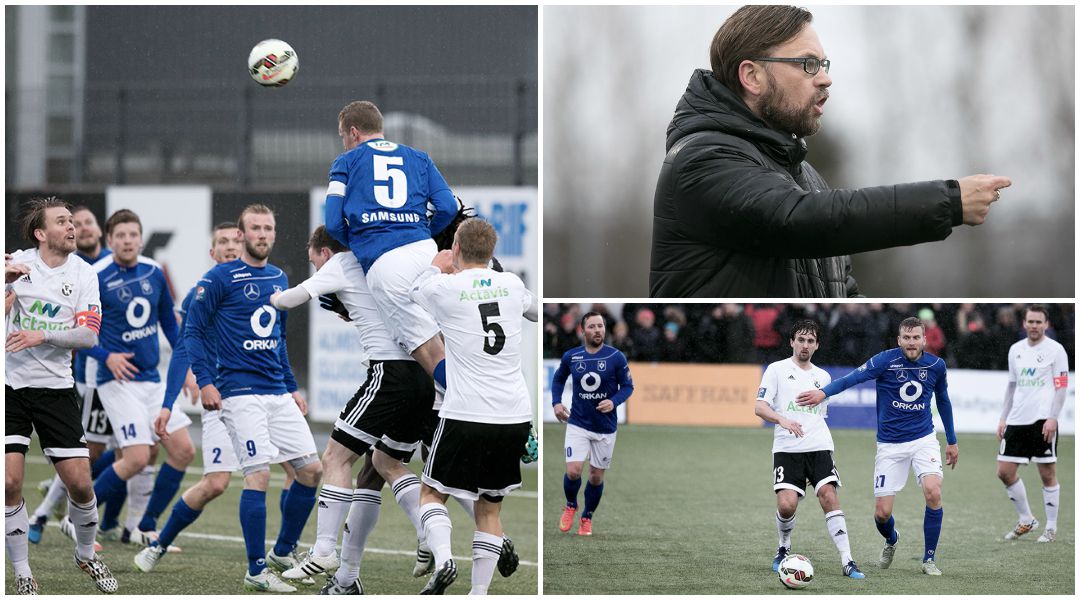
You have to get used to the darkness in winter, the constant light in summer, the snow and those winds
“Many of them were broken boys with similar stories,” says Toddy Orlygsson, the 41-time Icelandic international once of Brian Clough’s Nottingham Forest, now coach of HK Kopavogur and Iceland’s under-19 team. “They’ve been young professionals at top clubs and their technical levels are very high, but for one reason or another they’ve not made the first team. There’s nothing unusual about that – most youth team players don’t break into the first team – but it’s what they do next that is important. We know that they can be a success here in a very competitive league.”
For a season that lasts less than six months from May to early October at grounds with one or occasionally two stands, the Brits earn around £700 a week. Clubs prefer single players, as accommodating families can be expensive, but housing and cars are provided (“We shared a car and neither of us wanted to put petrol in it, so it was no surprise that we broke down,” Hewson laughs). And while crowds average just 1,000, a higher percentage of Icelanders go to football matches than anywhere in the world. If the 4.2 per cent who watch Icelandic football each week was matched in the UK, 2.7 million would be attending games every weekend.
“Glasgow isn’t the warmest either”
FH full-back Jon Jonsson is well-placed to assess the various vocal offerings – he’s also a famous singer and a judge on Iceland’s Got Talent
Iceland doesn’t feel like a football hotbed five hours before kick-off between Stjarnan and FH Hafnarfjordur, the country’s best two teams last season. Tillen, Hewson and Lennon all play for FH, Iceland’s richest club (their annual budget is £900,000), and the trio are spending time before the game eating chicken and rice with FFT to a backdrop of Sigur Rós (who else?). It’s late May in Reykjavik, but the temperature stays in single figures. They recall the fascinating end to last season when FH and Stjarnan (previously famous for their elaborate and intricately choreographed goal celebrations) went into the final game in first and second place, both with unbeaten records.
“We were top of the league,” says Lennon, who moved to Iceland in 2011. “I’d scored to equalise and we were drawing 1-1 against 10 men. That was enough. We were about to win the league; we were at home; we were the better team. Then they got a penalty in the 93rd minute.”
His voice trails off as he shakes his head. Stjarnan’s Olafur Karl Finsen calmly scored and the team from a wealthy Reykjavik suburb – their fans sing about having a silver spoon – won their first ever title. The FH players feel aggrieved and vengeful, but Killen is returning from injury and knows he’ll be on the bench. Hewson and Lennon will play against a team who knocked Bangor City, Motherwell and Lech Poznan out of the 2014/15 Europa League before succumbing to Inter Milan. Icelandic football is certainly on the up.
Raindrops sizzle on the coals of the burger stand as fans queue to get into Stjarnan’s one-stand stadium, where they’ll pay £7.50 to witness the biggest game in Icelandic football this season. Fans of the other, longer established Reykjavik clubs, KR and Valur, may disagree, but these are the two title favourites.
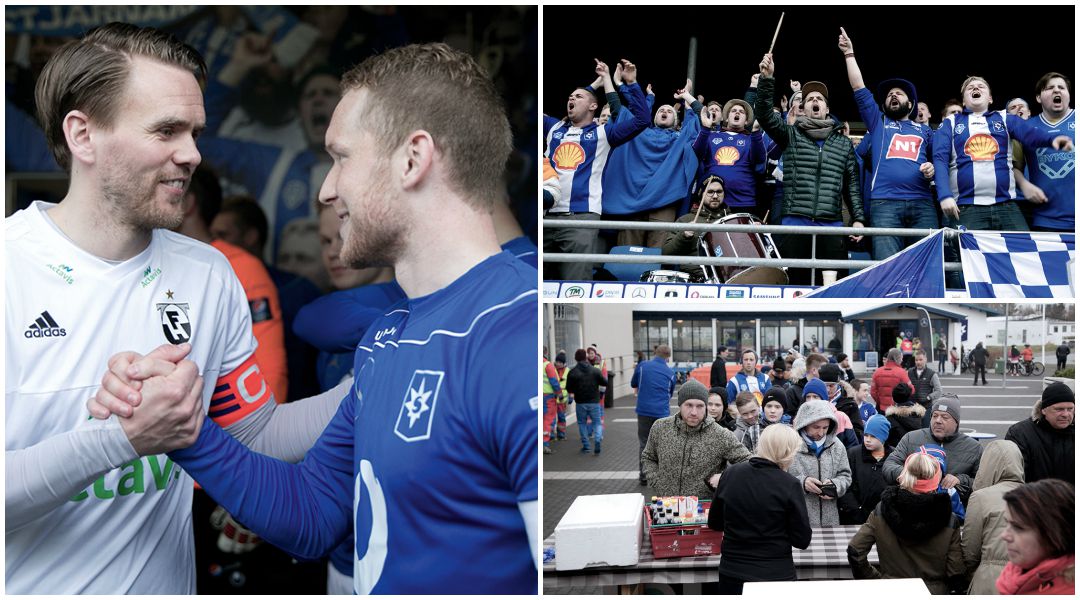
There’s no segregation and only two policemen are spotted all night among the noisy 2,000 crowd. Rival fans bellow songs to the tune of The Wild Rover and other British terrace anthems.
FH full-back Jon Jonsson is well-placed to assess the various vocal offerings – he’s also a famous singer and a judge on Iceland’s Got Talent. Among the spectators is Glaswegian youngster Moyes, who is signed to KR, the biggest and best-supported team in Iceland.
“People talk about the weather here, but Glasgow isn’t the warmest place in the world,” he says. “I’ve been impressed by the technical standards of Icelandic football, though it’s less physical than in Britain.”
All the players admit it’s unlikely to get them back into professional football in England – “You fall off the radar,” Hewson says – but Moyes is young and sees a summer spent in Iceland as a stepping stone to a brighter future. He’s not the first Brit to spend a short period of time in this country.
“It did me good and opened my mind to the world,” says Oldham Athletic’s assistant manager Dean Holden, who had a solid league career after his parent club, Bolton Wanderers, loaned him to Valur.
Numerous Brits have played in Iceland at the wrong end of their careers, from David James to Lee Sharpe – the latter of whom was not unpopular with Iceland’s not-unattractive female folk. Jim Bett was perhaps the most successful, playing in Iceland before and after spells at Rangers and Aberdeen.
Land of the midnight sun
I fell out of love with football and didn’t have the heart for it anymore. Iceland has given that back to me. I’m a professional footballer now, playing every week in a country that I love
Despite the fixture kicking off at 9pm local time, it’s still light for the duration – the floodlights are on, but not necessary.
The tempo of the match is slower than most Premier League watchers will be used to, but the standard is high. Hewson puts his head in his hands as his late volley is saved with the score at 1-1.
“If only that had gone in,” he moans. His frustration is minimal, however, compared to how he felt about football after leaving Manchester United.
“I played at Hereford, Bury and Altrincham. Then I had no club and worked in a factory, helping my mate.
"I fell out of love with football and didn’t have the heart for it anymore. Iceland has given that back to me. I’m a professional footballer now, playing every week in a country that I love, and I’m proud of it.” All the Brits appear to have rediscovered their love of football in the land of the midnight sun.
It’s still light when the players reconvene after the game at local bar Spot. Reminiscent of the Phoenix Club, setting for Peter Kay comedy Phoenix Nights, the large room is a usual haunt for the huge United and Liverpool supporters’ clubs in Iceland. The players can enjoy a pint and watch a highlights package.
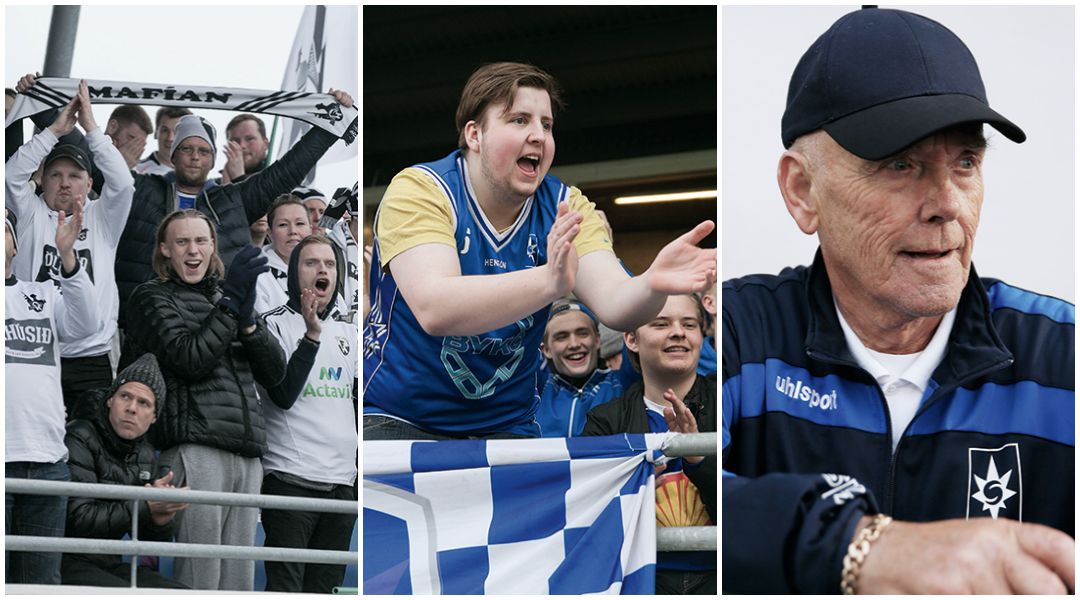
“What are they saying?” Hewson asks Tillen, who then duly translates the analysis of the studio pundits. “I’m having Icelandic lessons myself and my girlfriend is from here,” says Hewson.
"But it’s hard when everyone speaks English. Even on the pitch, they’ll shout in Icelandic and then quickly switch to English when they realise it’s you.”
It’s the routine visits to the family that Tillen misses most about England. “Skype is a godsend, but I miss Yorkshire tea and the ability to pop round for Sunday lunch,” he laments.
“But then I’ve sat in a river of hot thermal waters when my family have visited and it’s been one of the best experiences of our lives.” That sock purchase was prudent.
The Brits may be among the best players in Iceland, but the finest Icelandic players – those who pushed the team to a World Cup play-off against Croatia and who beat the Dutch 2-0 earlier this season to strengthen their push for a first major finals at Euro 2016 – play in Europe’s top leagues.
Swansea’s Gylfi Sigurdsson is the main attraction in a national team of non-stars; Eidur Gudjohnsen, 36, is back in the fold and still performing at Bolton. When Swedish coach Lars Lagerback became Iceland’s manager in 2010 they were ranked lower than Liechtenstein.
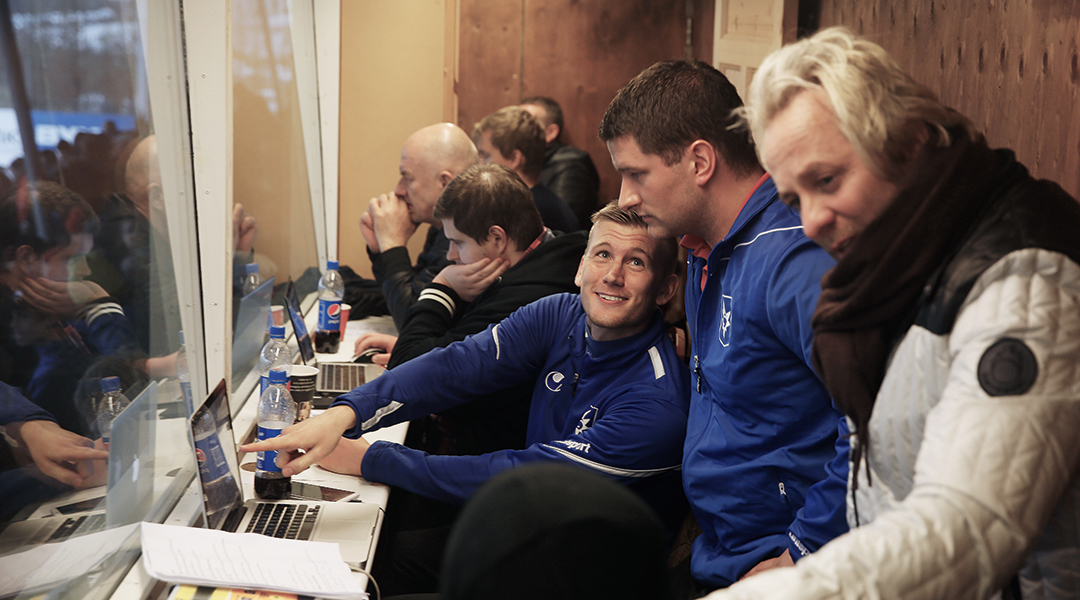
“Lars has an aura and the players have bought into it,” says Orlygsson. “He changed the tactics to 4-4-2 from our traditional 5-3-2. He uses aggressive players who have come through the ranks together.”
Iceland finished second in their World Cup qualification group and were one game away from being the smallest country to reach a World Cup finals – at least in terms of population (just shy of 330,000, marginally lower than Leicester). That form has continued with wins against Turkey and the Netherlands, with Lagerback ably assisted by joint-manager Heimir Hallgrimsson, an experienced dentist. “There’s also a feeling that everything is going for us; that it’s time to buy a lottery ticket,” Orlygsson adds.
“Games are ruined by the wind here”
I played 27 times for the national team and we used to lose every game. It was an amateurish environment and we knew before the game we’d lose
Bjarki Gunnlaugsson (twin brother of former Leicester and Bolton man Arnar), who spent three years at Preston North End during his playing career, explains the transformation.
“I played 27 times for the national team and we used to lose every game,” he tells FourFourTwo. “It was an amateurish environment and we knew before the game that we would lose. Home matches would get 4,000 [at the still-unwelcoming Laugardalsvollur National Stadium, with two stands and a running track] and everyone would cheer if we got a draw. The mentality is different now. They’re not afraid of anyone.
“We have a core of quick players who were born between 1988 and 1990. They have played together with the national team since they were 16 and they’re used to success – winning is a nice drug. When they were under-21s, they beat the Germany of Toni Kroos and Mats Hummels 4-1. They also reached the 2011 European Championship and beat Denmark, the hosts, 3-1.”
Their progress is not by chance. Orlygsson has taken the time to show FFT around the football centres, which stand out among Iceland’s low-density housing. These huge indoor halls, arched like prominent Victorian rail stations and often the most imposing buildings in the community, have been appearing across the country since the year 2000. There are now nine – some heated, and others with up to 1,800-seat stands.
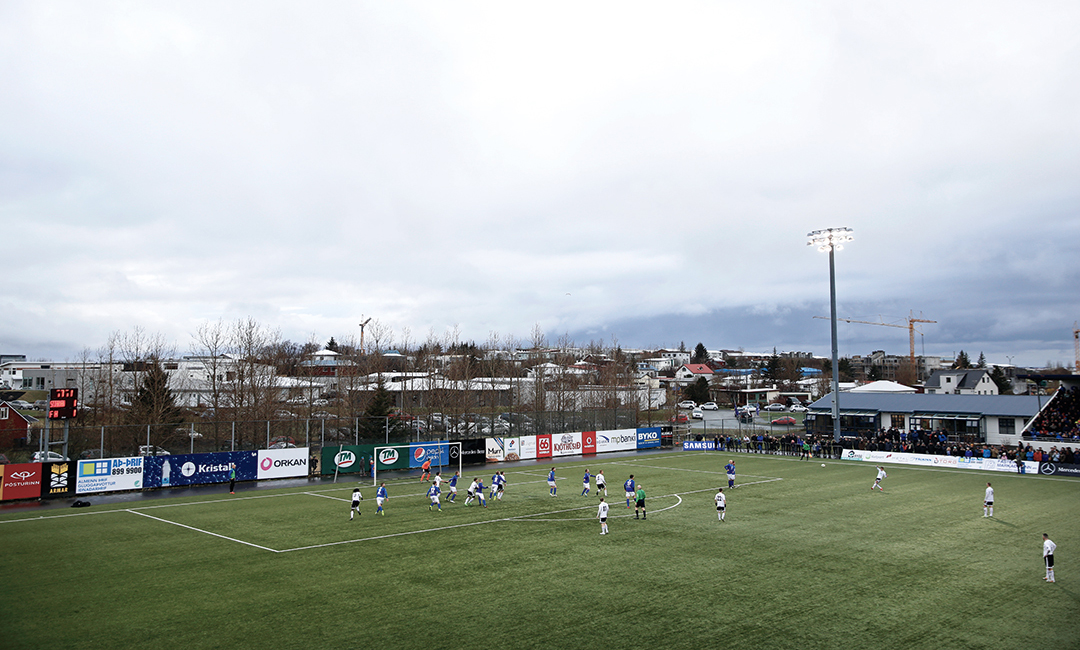
“The current national team were the first generation who could train all year round,” he says. “When I played, you couldn’t train properly during the winter months. You could run and do weights, but not practise technique, passing or drills.” Orlygsson believes these centres are the future of Icelandic football.
“The way forward is indoor football,” he says. “Wind ruins games here. I’d love to play on a beautiful grass pitch like Barcelona, but they have sun and we have cold and wind. These football houses are used by the community from 6am until 11pm every day and they raise funds for the clubs.”
As it is, with the short summer season and those underused floodlights, the best Icelandic players leave at 16 and the country’s foremost agent, Magnus Magnusson, has moved to Holland to be closer to his players and the rest of the football world. “Icelandic people adapt because they’ve historically had to move abroad to places like Copenhagen,” says Magnusson, who also looks after Iceland-raised US international Aron Johannsson, now at Bundesliga side Werder Bremen. “They’re not the most gifted natural talents, but the attitude of the boys is excellent: they speak English, they are independent and they are team players.”
Orlygsson explains that a change in the law has allowed players to move abroad far more freely. “When I played, you needed 10 international caps in order to get a work permit and there was only space for two substitutes," he says. "Now there are more opportunities for players abroad.”
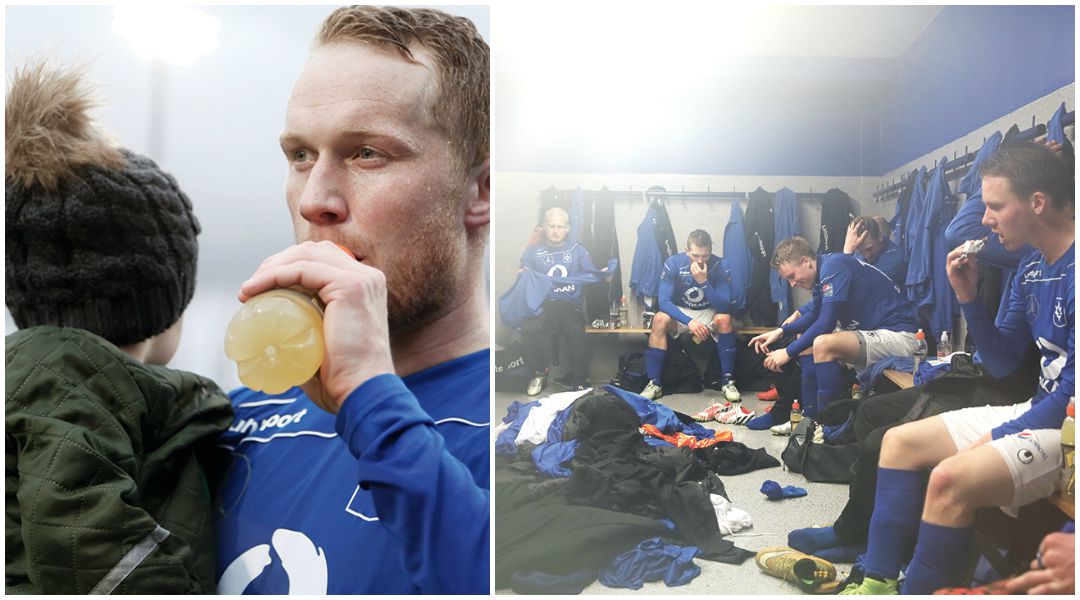
Calm down, Wayne: the top 10 international scorers of all time (includes Stern John)
The 13 best football kits of all time
Like many Icelanders, Orlygsson is an Anglophile and – Cod War and the Icelandic banking collapse aside – relations and cultural links with Britain are close.
“The only games we used to get on television were from England at 2pm on a Saturday,” he says. “So it was a dream for me to move to England and I really enjoyed it. I actually miss the good English weather. It’s better than we have here.”
Orlygsson didn’t buy thermal socks when he moved to Nottingham, but, like many Icelanders, he'll probably be booking flights to France next summer. The Brits in Iceland will be wishing the players from their adopted country every success there.
Pictures: Baldur Kristjans.
This feature originally appeared in the August 2015 issue of FourFourTwo magazine. Subscribe!

Andy Mitten has interviewed the likes of Lionel Messi, Eric Cantona, Sir Alex Ferguson and Diego Maradona for FourFourTwo magazine. He also founded and is editor of United We Stand, the Manchester United fanzine, and contributes to a number of publications, including GQ, the BBC and The Athletic.
 Join The Club
Join The Club





